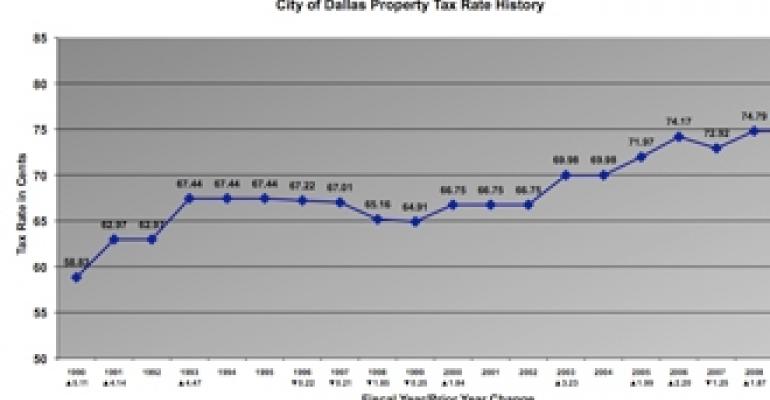Many property owners in Dallas are still steaming over the recent decisions by both the city and county to increase property tax rates to the highest levels in history. In September, the Dallas City Council voted to increase the property tax rate from 74.79 cents to 79.7 cents per $100 in value, a 6.5% increase. Only one day later, the Dallas County Commissioners voted to raise the county's property tax rate to 24.31 cents per $100 of valuation, an increase of 1.5 cents or 6.6 percent.
The bitter debate surrounding property tax rate increases in a struggling economy has captured headlines. Yet the clamor over rates misses the other half of the tax equation, which is valuation. Property owners should focus their efforts on reducing the appraised value to effectively manage property tax liabilities.

Tax talk
Local politicians and public leaders have been quoting property tax rates for the purpose of promoting their campaigns for years. Many incumbents boast that there have been no property tax increases under their tenure, by spinning the truth and incorrectly defining tax increases as changes in tax rates. In reality, the total bill paid each year is the correct measure on whether property taxes are going up or down.
The truth is that property tax rates tend to run counter cyclical to the overall real estate market, which leads to rate increases during down times (see City of Dallas Tax Rates Chart). The real estate market has more impact on the direction of property tax rates than any politician or public official. In tough times, city council members, county commissioners and other taxing jurisdictions usually are left with few options but to increase tax rates to offset a declining tax roll.
In Texas, the opportunity for taxpayers to challenge tax rates typically consists of voicing concerns and raising objections during public hearings. The ultimate vote by public leaders about the direction of tax rates usually comes down to the primary duty of balancing the budget and not the taxpayer’s question about paying higher taxes. Instead of ranting and raving about tax rates, most taxpayers would make better use of their time by examining their own property valuation and searching for ways to reduce that assessment.
Cracking the code
The Texas Property Tax Code specifically provides for challenging a property’s appraised value on two distinct fronts: market value, and/or “equal and uniform.” The Tax Code requires assessors to base property appraisals on the market value of the fee-simple interest, and to exclude any value attributable to intangibles. While these requirements exist in law, assessors commonly disregard them when determining value for property taxes.
Fee-simple valuations are based on market-driven variables that may or may not reflect a property’s actual performance. A fee-simple valuation utilizes market rents, market occupancy rates and market expenses. Essentially, the assessor must develop the value of the land and improvements, as if vacant and available to be leased.
Leased-fee valuations, on the other hand, base the value of the property on its actual performance by using contract rental rates, actual occupancy and expenses. The taxpayer or their representative must be well-versed in property appraisal practices and definitions so that they can recognize and explain the differences between fee-simple and leased fee valuations during the protest.
In addition to a market value claim, the Texas Property Tax Code also requires that property tax appraisals be equal and uniform among comparable properties which have been appropriately adjusted by generally accepted appraisal standards. Basically, that means a taxpayer’s appraised value should fall within a uniform range of values when compared to other comparable properties’ appraised values.
If a property is assessed disproportionately higher than comparable properties, a taxpayer can argue for a value reduction based on equality and uniformity, regardless of the fee-simple market value. An equal and uniform appeal may appear to be straightforward, but this approach requires diligence and expertise to select the proper comparables and appropriately adjust those comparables to the taxpayer’s property.
In order to be successful in an appeal, taxpayers should have a solid understanding of the property tax code, definitions, appraisal practices and the legal avenues available to contest taxes. Tax rates are part of the calculation of the property tax bill, but making sure your appraised value is correct under the specific context of the Texas Property Tax Code is the most effective way to control your property tax bill.

Michael Shalley is Director of Appeals at the Austin, Texas law firm of Popp, Gray & Hutcheson. The firm devotes its practice to the representation of taxpayers in property tax disputes and is the Texas member of the American Property Tax Counsel (APTC), the national affiliation of property tax attorneys. Mr. Shalley can be reached at: [email protected].

